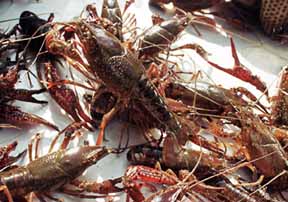| Smithsonian Magazine |
Cajun Crawfish Culture
Passing From the Land?
By Glynn Wilson/Photos by Dave Stueber
 |
| Roy Gaudet, 74, of Pierre Part, La., dumps crawfish into his boat |
When Roy Gaudet first started catching crawfish to survive, FDR was president. Huey Long, "The Kingfish," was in the Senate at the time, and was so assured of his election he wrote a book called First Days in the White House. It didn't work out for Long, and politics meant little to the young Roy Gaudet anyway. He was 9 and had to quit school to help his father feed a large and growing family from the riches of the Louisiana swamp.
At 74, Mr. Gaudet is the oldest living bona fide Cajun crawfisherman still working the bayous of the Atchafalaya Basin, according to the owner of Mike Blanchard's Seafood, who runs crawfish into New Orleans almost every day to the Big Fisherman on Magazine Street.
"I've been doin' this for a long time," Mr Gaudet said. "I can't even remember what it used to be like. It's always been hard. I never went to school much. I had to help my dad."
Mr. Gaudet can't read a newspaper, even though his picture's been in a number of them, back in the old days when they used to award an annual prize for catching the biggest crawfish. He's been featured especially in the Cajun Gazette, or La Gazette Cadienne, the local weekly newspaper in Pierre Part.
"What English I know I learned from my kids, and da TV," he says with a rich Cajun accent. "I don't know how to read much. I'm a real Coonass."
To get into the bayous where he nails his wire traps to trees, Mr. Gaudet has to go over or around floating logs and treacherous stumps, some hidden in the muddy brown water. He's been known to bounce off a tree or two along the way, and he knows where the stumps are like a Mississippi River steamboat captain knew the sandbars.
His wife and son might have a hard time finding him this far in the swamp, however, if something went wrong. Still living in a culture that dates to the 1700s -- when the Cajun people were cruelly exiled from New Acadia (Nova Scotia) by the British for refusing to swear allegiance to the Crown -- he doesn't carry a cell phone.
"We could have a great season," he said, maneuvering the custom-made 17-foot crawfish boat through the swampy labyrinth, "if the Corps of Engineers would give us some more water down here."
After the drought last year, no one expected much from the crawfish season of 2001. But the rains picked up this winter, and retail prices have fallen from a high of $4 a pound last year to $1.99 cooked in New Orleans this year.
"The crawfish are here, better than last year," Mr. Gaudet said. "They got all that water up north, with the flood and all. I don't see why they couldn't let us have some of it."
Mr. Gaudet hauls up a trap. He unhooks it at the top, which must remain only a few inches above the water line or the crawfish will die from lack of oxygen, and dumps the clawing little lobsters on the table. According to legend, crawfish are genetically or divinely shrunk lobsters, which followed their masters down to Coastal Louisiana from the Old Acadia.
 |
| Red Crawfish from the Louisiana swamp |
The farm-raised crawfish season potentially runs from November to July. More realistically, the wild crawfish season runs from January through June.
This year, more crawfish are coming from the wild than ponds due to environment and health problems with the farms, and a successful lawsuit against unfair competition by Chinese crawfish farmers.
Meanwhile back in the swamp, some of the crawfish trail is obscured beneath patches of rubbery-looking green lilly pads, where the most and largest crawfish hide. The purple and yellow flowers are no distraction for Mr. Gaudet, whose mind is totally engrossed in getting through the swamp to the next orange and white flag.
Nor does he pause to notice the blue herons, brown pelicans, red-winged blackbirds, hawks, owls or woodpeckers along the way, a sight tourists would pay good money to see. To him, this is a job, not an adventure.
Trap thieves are another danger. A man who would stoop to robbing another man's trap is the lowest form of criminal in Acadia, like a horse thief in Texarkana.
"I couldn't do dat," Mr. Gaudet said. "The man upstairs, he's always watchin'."
They used to hang horse thieves without even bothering to call the law. Down here, a bad man like that might just turn up missing, written off as gator bait. Every culture has its law built from ethics and morality, whether a gun and badge patrol the territory or not.
Aside from the water level, snakes, falling trees and the price of gas and bait, Mr. Gaudet most worries about the kids of Acadia, he said. Just like the children of shrimpers and other long-standing commercial fishing industries on the Gulf Coast, it will not be financially possible for them to follow in the footsteps of their parents.
"It's a rough time for fishing," he says, peering off into the distant swamp. "It's always been tough. But now, whewey. The kids, they got to go to school. But they ain't goin' to have work in the offices for everybody."
(more)
Glynn Wilson is a writer and Dave Stueber is a photographer. They are both based in New Orleans and available for free-lance jobs.
Links:
Piroque boat design:
http://home1.gte.net/jspira/boatbuilding/d_caju.htm
Chinese lawsuit
http://www.american.edu/projects/mandala/TED/crawfish.htm
Crawfish culture
http://www.american.edu/projects/mandala/TED/crawfish.htm#r6
Big Fisherman Seafood
http://www.bigfishermanseafood.com/
Blanchard's Seafood
http://www.blanchardcrawfish.com/crawfish.htm
Copyright © F.A.S.T. 2001